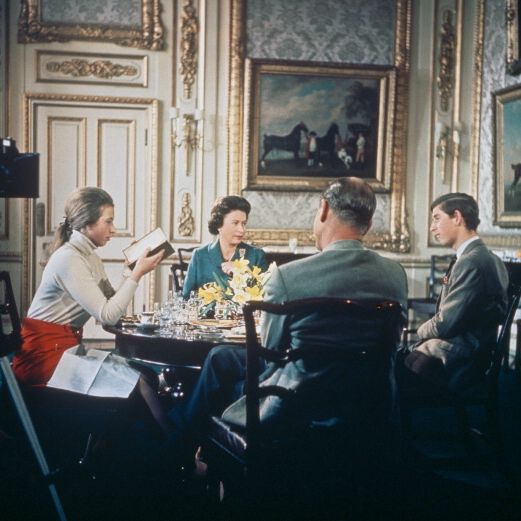49 years after it was banned by the Queen of Britain, the controversial documentary "The Royal Family" is making a comeback online.
The number of films, serials and books that dealt with the life of the royal family in Britain may seem infinite, and with the different levels of accuracy of documentation and the exaggerated transfer of the lives of Queen Elizabeth and her family members, the question that arises in minds is why the family did not object to everything that reveals the secrets of family members behind the doors the palace?
The truth is that there is a long history of disagreement between members of the royal family, the press, and television and film production, which may turn a blind eye sometimes, and it may reach the issuance of royal orders or the judicial settlement of the dispute, but what about the "Royal Family" documents that Queen Elizabeth allowed to film And it was shown on the BBC, until a royal order was issued to prevent it from being shown and listed in the Royal Archives, to reappear again in the past weeks?
The story of the movie began when Queen Elizabeth, Prince Philip and their families allowed cameras to follow their daily lives over an 18-month period in 1968 and 1969, and the result was a documentary that was broadcast by the BBC.
The documentary was shown on television for the last time after only 3 years, when the Queen issued an order to prevent it from showing again in 1972. Now royal fans have a rare opportunity to watch it.
The film cast a behind-the-scenes look at the royals, including their barbecue scenes at events, and the Queen's brief talk with President Nixon, in which the intention was to make the family more connected to the public at the time.
According to the British newspaper The Independent, the documentary attracted 30 million viewers when it first aired on BBC, and another 15 million viewers when it was broadcast on ITV a week later.
However, the film faced criticism from royal censors, who argued that the behind-the-scenes nature of the documentary was breaking royal prestige in front of the people.
William Heseltine, Queen Elizabeth's press secretary at the time, confirmed that they had placed "very severe restrictions" on the film, as they noticed a "major public shift in attitudes toward the family," according to The Independent.
Speaking to ABC, royal biographer Hugo Vickers said the documentary would spark public curiosity to learn more about the family, and would open the doors wide, making family life common for all.
Who leaked the original version?
In the report published by the French magazine "Le Point", Marc Roche said that the hacker managed to bypass the ban imposed by the queen - the copyright holder - to re-publish it on social media platforms.
In fact, the hacker not only compromised the security of the palace's computer system and the BBC, but also managed to get his hands on the original, uncensored version of the 110-minute film directed by Richard Custon, which left a milestone in the history of royal television.
In the original copy, the Queen describes US Ambassador Walter Annenberg as a "gorilla."
The film also shows scenes documenting the heir to the throne Prince Charles skating on the water with a bare chest.
An offensive image of the royal family
The final version of the documentary released in 1969 highlighted the simplicity of royal life by showing the Queen and her family surrounded by their horses and dogs, or cooking sausages at a barbecue in Scotland.
However, this distinct accent family appears to be very tough and ruthless, showing no sympathy for others and a prisoner of strict protocols they adhere to even during the holidays.
The film also shows the queen wearing a pearl necklace during a family outing in Balmoral Castle, without depicting her doing some life matters such as eating and drinking.
Realizing that the existence of the monarchy depends to a large extent on the public image of the royal family, Queen Elizabeth II gave permission for the cameras to photograph her official activities and family life for an entire year.
The number of the team was only 3 people, including Custon, director, sound engineer and cameraman with complete freedom of movement.
A Buckingham Palace spokesman said, "The film should never have been shown on YouTube, and once it was published, the BBC withdrew it based on copyright."

